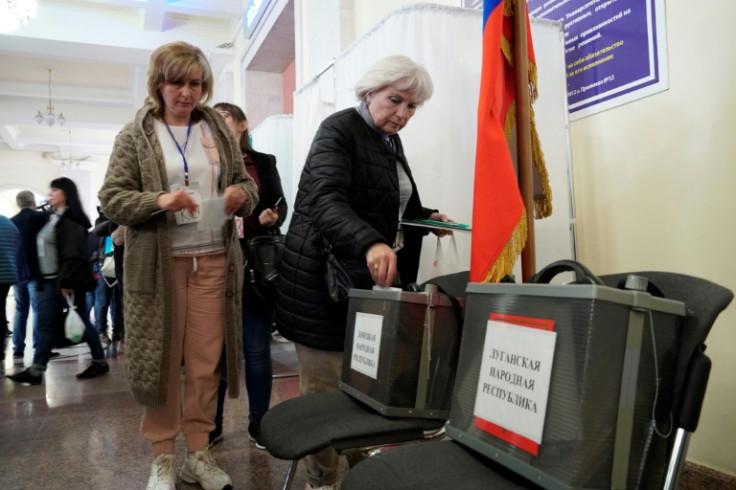The Kremlin Claims Abandoned Ukrainian Territories Will Be Retaken
KEY POINTS
- The Kremlin said annexed Ukrainian territories were only temporarily abandoned by Russian troops
- No decision yet on transforming Russia's "special military operation" in Ukraine into a "counter-terrorism operation"
Amid news of Ukrainian forces clawing back territory from the retreating Russian troops, the Kremlin has said that Russia will retake abandoned parts of the annexed regions.
Kremlin spokesman Dmitry Peskov on Wednesday said designating the military operation as a counter-terrorism operation is President Putin's prerogative.
Peskov said the Ukrainian territories were only temporarily abandoned by Russian troops and claimed that they'll be retaken. He added that the "special military operation" will continue, and no decision has been made on transforming it into a "counter-terrorism operation."
"This is entirely the prerogative of the supreme commander-in-chief -- the president of the country. To date, no such decisions have been made. We are talking about a special military operation that is ongoing," the Kremlin spokesman is reported to have said while speaking at a press briefing in Moscow.
The spokesman also said territories that are part of Donetsk, Kherson, Luhansk, and Zaporizhzhia regions are now part of Russia.
With Russian officials repeatedly warning that any attack on the annexed territory would be considered an attack on Russia, there's been speculation that Putin is set to change the status of what he's so far called a "special military operation" to a counter-terrorism operation.
Denis Pushilin, the pro-Russian leader in Donetsk, said that with the completion of the legal process of joining Russia, the operation was "moving to a new stage of military action."
Earlier in August, two Russian lawmakers, referring to the killing of Darya Dugina and shelling of the Zaporizhzhia nuclear power plant as terrorist acts, called the "special military operation" to shift focus as a "counter-terrorist operation," so that its main goal becomes the "elimination" of Ukrainian President Volodymyr Zelensky and his administration.
Facing defeat in key Ukrainian territories earlier occupied by Russian troops, Moscow's military leadership has faced unusual public criticism from powerful supporters of President Vladimir Putin. This public criticism comes as a striking sign of dissent at a time when Moscow is trying hard to project an image of strength and unity.
Despite Ukrainian advances, there's been no word from Moscow on what it intends to do to keep the regions annexed from Ukraine. Meanwhile, the Russian President on Wednesday signed the final papers to annex four regions and said he believed the situation would soon stabilize.
"We are working on the assumption that the situation in the new territories will stabilize," Putin said during a televised video call with Russian teachers.
Amid reports of the bungled mobilization effort and setbacks on the battlefield, there have been signs of political confusion in Russia, which acknowledged Monday that it needed to "consult" with the local population to determine the borders of the occupied Ukrainian regions that it annexed following referendums widely condemned as sham votes.
In a move following the widely condemned referendums, Russian President Vladimir Putin on Friday signed decrees annexing four occupied Ukrainian regions — Kherson, Zaporizhzhia, Luhansk, and Donetsk — making them part of Russia.

© Copyright IBTimes 2024. All rights reserved.





















